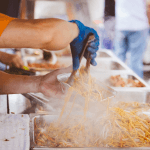Janine shared a revelation she had with me a few months ago about how our thinking has changed regarding the people we work with here in Delhi. It’s a subtle shift, but it makes a huge difference to how we relate to and live alongside the people here. We came to India to ‘work with the poor’ and to ‘minister into slums’, but these days we don’t really use the words ‘poor’ or ‘slum’ when we talk about our community, instead we talk about our ‘friends’ and we visit their ‘homes’ for chai and rusks.
I guess the changed happened after building relationships with people. They don’t see themselves as poor and they are proud of their homes – they understand more than we ever could that having enough to eat most days and having a roof over your head means you are definitely not poor, even if you share one windowless room with the other 8 members of your family.
Manju, a girl in her 20’s in our young adults group, weeps when she talks about the poor. She herself was sent from the village at 11 to work as a servant in a home, working from 6am-midnight for little more than 12 pounds a month. She’s had an extremely hard life thus far. She knows what it is to suffer, yet she has incredible compassion for the people living on the streets, people with no hope.
Ravi, another guy in our group lost his father to alcoholism when he was a teenager and his mother to cancer just 2 years ago. As a small boy he worked in a factory losing out any chance of an education, but now he is determined to make something of his life, to help provide for his younger sisters, to change their outcome. You can call Ravi anytime day or night and he will come and help you, smiling and ready to do whatever he can. I often see him out and about, busy helping someone or other out – whether its searching for a room for an elderly couple that can no longer climb the stairs in the big buildings where everyone lives, or helping someone get an I.D card so they can open a bank account or access healthcare.
We have such a privilege of leading young adults like these, and we’ve seen their lives changed, their identities reformed as they put their hope in Jesus. But we are also learning so much from them. We’ve learnt that real poverty is not in living in one room, it’s not sharing a bathroom with 100 other people or working as a domestic help or day labourer – real poverty is living without hope, without a sense of value for your own life or others’. You are poor when you don’t understand your worth in Jesus and know how much He loves you. And that’s why we love spending time with the Ravi’s and the Manju’s here, because when we’re with them we see Jesus. They are looked down upon and scorned by so many because of the darkness of their skin, their caste and the area they live, but they know their value isn’t in those things. God is unearthing treasure here. His Kingdom is coming, and when we walk the streets where they live, we know we are walking on streets paved with gold.



